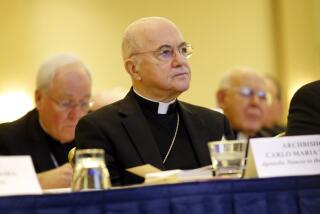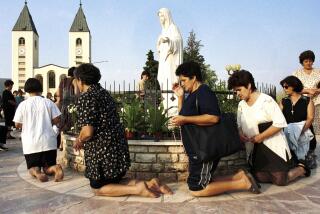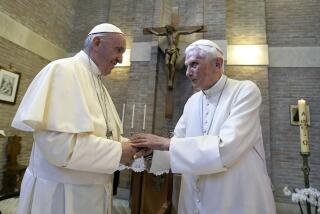American Jesuit’s Book Spurs Vatican Inquiry
- Share via
In an escalating conflict between religious pluralism and Roman Catholic orthodoxy, the Vatican is investigating an American Jesuit theologian who proposed, in an award-winning book, that people can find salvation by means other than Jesus Christ.
The Vatican placed the Rev. Roger Haight on leave last fall from his teaching post at Weston Jesuit School of Theology in Cambridge, Mass., during the investigation of his 1999 book, “Jesus Symbol of God.”
The 505-page book, hailed by critics as a “cutting-edge” work that seeks to explain the significance of Jesus Christ within today’s religiously diverse society, won first prize in the theology category from the Catholic Press Assn. but failed to pass muster from Cardinal Joseph Ratzinger, the Vatican’s enforcer of orthodoxy.
The Vatican action represents the latest effort to clamp down on liberal Catholic responses to religious pluralism. Last year, in a controversial document known as “Dominus Iesus,” it declared that the church’s mission was “endangered today by relativistic theories which seek to justify religious pluralism.”
In 1998, the Vatican’s Congregation for the Doctrine of the Faith investigated another Jesuit priest, Jacques Dupuis, for suspicion of heresy for his book “Toward a Christian Theology of Religious Pluralism.” Dupuis was notified in March that his work contained “ambiguities” that could lead readers to “erroneous or harmful positions.” And last year, in a move that offended many Protestants, the Vatican declared that only Orthodox churches could be considered “sister churches.”
Ratzinger has warned that the theology of religious pluralism represents a similar threat to Roman Catholicism that liberation theology did in the 1980s.
In recent years, the Vatican has refused to approve at least five American Jesuits suspected of straying from orthodoxy to serve as administrators or members of pontifical faculties, according to the National Catholic Reporter.
Haight, a professor of systematic theology and former president of the Catholic Theological Society of America, has declined all interview requests pending the outcome of the Vatican investigation. In a statement, Weston President Robert E. Manning said the theologian “has begun the work of clarifying his book in a spirit of fraternal dialogue and will continue this important task for the sake of the church.”
The Vatican’s inquiry of Haight, which was made public in the Catholic press last summer but came to national attention this week in the Boston Globe, sparked concern from Catholic theologians.
“The Vatican is really clinging to a world which is Eurocentric and Christocentric, and we’re realizing that’s not the world out there,” said Francis Schussler Fiorenza of Harvard Divinity School. “The majority of people now may be Muslims, Buddhists, Confucianists, and what will Rome say? That the only way to look at them is that they are in error?”
Fiorenza said that the issue of religious pluralism is one of the hottest issues facing the church today, as the center of Catholicism shifts to Latin America, Asia and Africa--places long influenced by other faith traditions. Many theologians, he said--including himself--now recognize the authenticity of other religions and their approach to the divine.
He said he personally disagreed with the Vatican that salvation is attainable only through Jesus Christ. “I think God is greater than that,” he said.
Father Thomas Rausch, chairman of Loyola Marymount University’s theological studies department in Los Angeles, called the Vatican moves “alarmist” and said they hurt the church’s ecumenical work. He said, however, that some of Haight’s views on salvation did appear to contradict fundamental Christian doctrine. Since the Second Vatican Council in 1964, the Catholic Church has taught that even non-Christians who lead good lives can win salvation through God’s grace, Rausch said. (Conservative Protestants, however, believe that an explicit acceptance of Christ as savior is required.) But Christian doctrine in all denominations holds that the death and resurrection of Jesus Christ is what made salvation possible for all people in all times, Rausch said.
Still, Rausch lauded Haight for struggling to present more relevant ways to share the gospel in today’s pluralistic world.
“I’m personally disappointed that the Vatican is so nervous about the theological conversations taking place around the world and is so quick to see error and dangerous teachings to the faithful,” Rausch said. Most theologians, he added, are simply “trying to find a way to reexamine Christianity in a ways that make more sense to contemporary men and women.”
Rausch added that the recent spate of crackdowns could reflect “various Vatican congregations positioning themselves for the next pontificate.”
More to Read
Sign up for Essential California
The most important California stories and recommendations in your inbox every morning.
You may occasionally receive promotional content from the Los Angeles Times.











